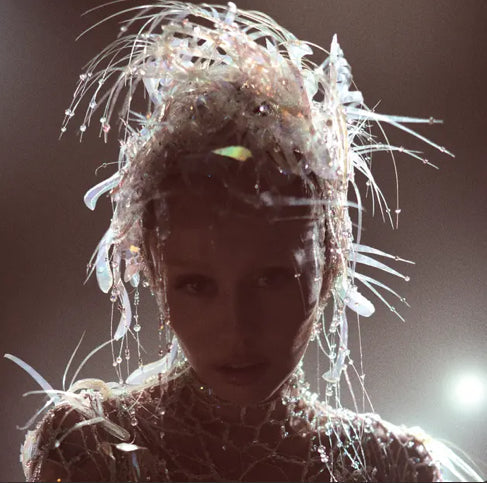
Miley Cyrus has never been afraid of reinvention, but Something Beautiful feels like more than just another stylistic shift — it’s a full-blown rebirth. This isn’t simply a pop record or a genre experiment. It’s a cinematic odyssey, threaded with carefully placed interludes, unexpected sonic turns, and a narrative arc that unfolds like a film. It may be her most ambitious project to date — a complete immersion into a world that feels as expansive as it is intimate.
The album opens with Prelude, an atmospheric, emotionally loaded intro that sets the tone immediately. Soft cellos hum beneath unsettling piano chords, a deep bassline pulses like a heartbeat, and Cyrus’s vocals arrive distorted and ghost-like — not quite singing, not quite speaking, but guiding. It feels less like a song and more like an invocation, pulling listeners into a storm that’s just beginning to unfold. When the violins crash in, it’s a moment of catharsis — a signal that we’re stepping into something vast, unpredictable, and deeply human.
The title track, Something Beautiful, encapsulates the duality that defines the album. What begins as a smoky, jazz-tinged lounge number — complete with husky vocals and lush saxophone — suddenly transforms into a gritty rock outburst. The transition is jarring, but intentional. It’s Miley at her best: balancing softness and power, vulnerability and defiance. When the track fades out, it leaves behind a feeling like the echo of a memory — tender, haunted, and real.
Throughout the album, Cyrus leans into her pop sensibilities without sacrificing depth. End of the World recalls her chart-topping roots, but layers that catchiness with emotional urgency. The verses simmer with tension before giving way to a euphoric, almost apocalyptic chorus — both celebratory and tragic, all at once. Then there’s More to Lose, a slow-burning ballad where pianos and violins wrap around her voice like a fog. It’s aching, stripped-back, and honest, showcasing her ability to convey heartbreak in its rawest form.
The interludes — Interlude I and Interlude II — aren’t throwaway transitions. Instead, they serve as essential connective tissue, weaving together the album’s wide-ranging moods and genres. They drift between noir-inspired instrumentation and futuristic synth landscapes, fusing vintage drama with modern energy. These short pieces feel like transitional scenes in a movie — subtle, but emotionally loaded.
On the lighter, more playful end, Easy Lover and Walk of Fame (featuring Brittany Howard) bring a welcome groove to the mix. Easy Lover borrows from ‘70s soul with its slinky bassline and percussive snap, while still carrying Miley’s smoky vocal grit. Walk of Fame, on the other hand, bursts open like a disco inferno. It’s full-bodied, constantly shifting, and alive with electricity. When Brittany Howard’s voice cuts in, it’s like a dialogue between two powerful forces — Miley’s raspy, grounded delivery sparring and harmonizing with Howard’s fiery range. It’s one of the most joyously chaotic moments on the record.
But Something Beautiful is not afraid to go dark. Pretend You’re God sinks into a hypnotic swirl of heavy bass and watery synths, mimicking the sensation of drowning in one’s own thoughts. It’s moody, seductive, and quietly devastating. That same internal tension resurfaces on Every Girl You’ve Ever Loved, featuring an unexpected — and commanding — vocal performance from Naomi Campbell. The track is theatrical, with sharp saxophones, shimmering beats, and strings that haunt the edges of the mix. Naomi’s presence is more than a feature; it’s a performance. Her delivery adds another layer of mystique, turning the song into a kind of emotional battle scene.
Then comes Reborn, the spiritual and emotional centerpiece of the album. Swirling with distorted vocals, chant-like refrains, and echoing choirs, it floats between grounded funk and celestial transcendence. This is the track where the themes of transformation reach their peak — it feels ancient and futuristic all at once. It’s the sound of Miley Cyrus pulling herself from the wreckage and ascending — not polished, not perfect, but alive and renewed.
The final track, Give Me Love, is the graceful exhale at the end of the emotional storm. Acoustic guitars, warm brass, and layered vocals create a sense of peace and closure. There’s gratitude here, not just in the lyrics but in the performance itself. It doesn’t try to be a grand finale — instead, it leaves us with a soft landing, a promise that even after chaos, there’s light. It’s a goodbye that also feels like a hello to whatever comes next.
In the end, Something Beautiful delivers on its name in every way — not by chasing perfection, but by finding beauty in contrast, contradiction, and chaos. It’s a journey through grief, passion, vulnerability, reinvention, and joy. Cyrus has crafted something cinematic and deeply personal, a record that demands full attention and rewards it with emotion at every turn. It’s experimental without being scattered, intimate without being narrow, bold without being overbearing.
This isn’t just a collection of songs — it’s a world. And in inviting us into it, Miley Cyrus doesn’t just show us who she is now — she reminds us that becoming is the most beautiful thing of all.
Rating: 9.5/10
NOTABLE TRACKS:
Something Beautiful
End Of The World
Easy Lover
Reborn

